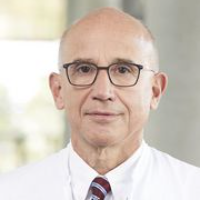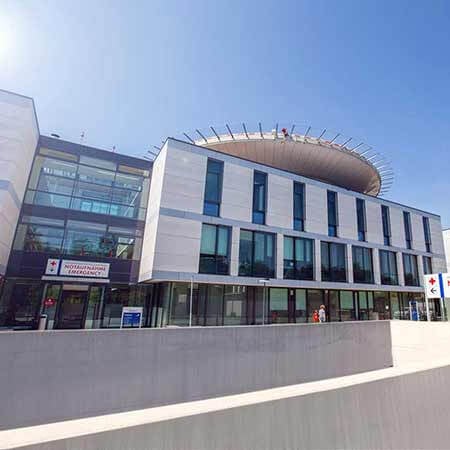Acute Myeloid Leukemia (AML) — CAR T-cell Therapy: treatment in the Best Hospitals of Germany
Treatment prices are regulated by national law of the corresponding countries, but can also include additional hospital coefficients. In order to receive the individual cost calculation, please send us the request and medical records.

Department of Hematology, Oncology, Rheumatology, Infectology and Bone Marrow Transplantation
The Department of Hematology, Oncology, Rheumatology, Infectology and Bone Marrow Transplantation offers modern diagnostics and treatment in all areas of its specialization. The medical facility treats patients with solid malignant tumors of various locations, malignant and benign diseases of the hematopoietic system, rheumatic diseases, and infections. The department enjoys a reputation as one of the leading health facilities for bone marrow transplants in Germany, which is confirmed by accreditation in accordance with JACIE standards. More than 80 allogeneic and more than 100 autologous bone marrow transplants are performed in the medical facility annually. In addition, the department successfully carries out innovative CAR T-cell therapy, which is available only in the most advanced medical centers worldwide. The department is part of the Comprehensive Cancer Center Ulm (CCCU), where a multidisciplinary team of highly professional doctors takes care of the health of patients. The high quality of medical services is confirmed by the certification of the German Cancer Society (DKG). The health of patients is in the safe hands of experienced specialists who strive to provide each patient with the most effective treatment using advanced therapeutic methods. The medical facility has 112 beds and many specialized outpatient clinics.







Department of Hematology and Oncology
The Department of Hematology and Oncology offers the full range of diagnostics and treatment of blood diseases, coagulation disorders, oncological diseases and related pathological conditions. The treatment is provided both on an outpatient and inpatient basis. The patient is offered a comprehensive treatment, including intensive care to eliminate side effects associated with the tumor and therapy, development of individual recommendations on nutrition, physiotherapeutic measures and psycho-oncological care.


Department of Hematology, Oncology, Hemostaseology, Rheumatology and Infectology
The Department of Hematology, Oncology, Hemostaseology, Rheumatology and Infectology offers the full range of medical services in the fields of its specialization. The department specializes in the diagnostics and treatment of all diseases of the hematopoietic system, systemic treatment of solid tumors, infectious diseases, including outpatient admission of patients with HIV, blood clotting disorders, as well as the entire clinical and morphological group of rheumatic diseases. The department is actively engaged in research activities and regularly implements the latest medical developments into clinical practice, thereby providing treatment in accordance with the most advanced scientific achievements.






Chronic myelogenous leukemia is an oncohematological disease that develops as a result of uncontrolled division of precursor cells of erythrocytes, platelets, and most types of leukocytes. Pathological changes are associated with the BCR-ABL gene, which turns normal cells into leukemic ones. The disease slowly progresses, but can subsequently turn into acute myeloid leukemia (AML) with a severe clinical course.
Content
- Targeted therapy
- Other drugs for chronic myelogenous leukemia
- Radiation therapy
- Surgical treatment
- Stem cell transplant
- Other treatment methods
In most cases, the disease can be well controlled with targeted therapy. Patients rarely require radiation therapy or surgery to remove the spleen. With an insufficient effect of targeted therapy for chronic myeloid leukemia treatment, German doctors use chemotherapy, immunotherapy, and a stem cell transplant.
You can undergo your treatment at one of the university hospitals: University Hospital Ulm, University Hospital Heidelberg, or University Hospital Freiburg.
The Booking Health company will take care of the organization of your trip so you don't have to worry about anything. Our employees will select a hospital and tell you about possible treatment methods. They will make an appointment without a long wait, help you to get a visa and collect the necessary medical documents. An interpreter will accompany you to the clinic. Your medical records and recommendations will also be translated into your native language. You can contact the Booking Health coordinator with any questions during the treatment process.
Targeted therapy
The basis of chronic myelogenous leukemia treatment in Germany is targeted therapy with tyrosine kinase inhibitors. Drugs targeting the BCR-ABL gene are used. They work best in the chronic phase of the disease and are less effective (although they are used by doctors) in the acceleration phase or the blast stage.
Drugs do not cure the disease once and for all, so they need to be taken constantly. With poor tolerance to drugs, dosages may be reduced. It is important to follow the regimen prescribed by a doctor, since skipping entails a decrease in the effectiveness of therapy.
Other drugs for chronic myelogenous leukemia
Interferon alpha is an artificial drug that acts like endogenous interferon produced in the human body. It blocks the growth and division of leukemic cells.
In recent years, interferons have been used less frequently in developed countries. This is because tyrosine kinase inhibitors provide better results with fewer side effects. They are also more convenient to use as they are taken as tablets, while interferons have to be injected subcutaneously every day.
Cytotoxic chemotherapy is still occasionally used for chronic myeloid leukemia, but this treatment option is much less frequent. In the 20th century, it was the main treatment method, but now doctors in clinics in Germany prescribe these drugs only in cases where targeted therapy no longer works. Chemotherapy can also be used before a stem cell transplant.
Radiation therapy
Radiation therapy can rarely be used. This is prescribed in cases where the affected organs become too large and need to be quickly reduced to relieve symptoms and prevent complications. Doctors mostly irradiate the spleen so that it does not press on the stomach.
Surgical treatment
Unlike other types of cancer, chronic myeloid leukemia does not require surgical tumor removal. However, some patients require surgery to relieve symptoms.
A splenectomy is the most common intervention for chronic myeloid leukemia. The operation involves the removal of the spleen. As a result, not only does the pressure on the surrounding organs decrease, but the process of destruction of blood cells slows down, which reduces the need for blood transfusions.
Doctors in Germany perform a splenectomy using a minimally invasive laparoscopic method, that is, through short incisions. Such surgical interventions are less traumatic, safer and provide a quick rehabilitation of patients.
Stem cell transplant
With the advent of highly effective targeted therapies, a stem cell transplant for chronic myelogenous leukemia is performed less frequently than before. But still, some patients need this procedure.
Doctors perform a donor stem cell transplant, as only this transplant option helps to cure the disease. Since the procedure is unsafe, it is preferred for young patients and children. It is better that the donor is a sibling, as it is not always possible to find a suitable unrelated donor.
Other treatment methods
Other treatment options are being tested in clinical trials. For patients with severe forms of the disease that do not respond to standard therapy, doctors try to use the following methods:
- a combination of targeted therapy, chemotherapy and interferon;
- drugs against T315I mutant cells (patients with this mutation do not respond well to standard targeted therapy);
- cancer vaccines;
- CAR T-cell therapy (injection of a patient's own immune modified cells).
You are welcome to use the Booking Health service to undergo your diagnostics and treatment of chronic myeloid leukemia in one of the medical centers in Germany. On our website, you can find prices, compare the cost of treatment, and make your appointment at the best price. The specialists of the Booking Health company will help you to choose the most suitable hospitals in Germany and organize your trip.
Authors:
The article was edited by medical experts, board-certified doctors Dr. Nadezhda Ivanisova and Dr. Sergey Pashchenko. For the treatment of the conditions referred to in the article, you must consult a doctor; the information in the article is not intended for self-medication!
Sources:

